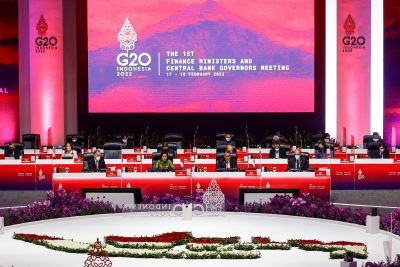Subscripe to be the first to know about our updates!

G20 and RCEP key to powering global recovery and development
Mari Pangestu – Lili Yan Ing
There are two major platforms for international cooperation that can spur economic recovery in the developing world. One is the G20, which represents two-thirds of the global population, 90 per cent of the world’s GDP and 80 per cent of trade. The other is the Regional Comprehensive Economic Partnership (RCEP), which took effect in January 2022. The partnership’s 15 members represent about one-third of the world’s population, GDP, trade and investment.
Both have the capacity to address four big trends — global value chains, digitalisation, climate change and pushback against globalisation and protectionism — which have been reinforced by the COVID-19 pandemic and to which countries must adapt. The Russia–Ukraine conflict will further disrupt global supply chains and raise protectionism.
Trade continues to be an engine of growth and is playing a key role in the recovery spurred by global value chains. In January 2022, the value of total trade in goods was 25 per cent higher than pre-pandemic levels, largely led by growth in electrical and electronic equipment, medical equipment and minerals. Yet trade recovery has been uneven and faces new uncertainties given developments around the world.
Regions that are highly integrated into global value chains — East Asia, Eastern and Central Europe, and the Middle East — have shown the fastest growth. Those that are less integrated — South Asia, Latin America, and Africa — have lagged. Border closures, lockdowns and other COVID-19-related disruptions exposed the vulnerability of global value chains, leading to calls for greater protectionism and reshoring production of vital goods, especially medical goods and semiconductors. Recent World Bank research shows that supply chains are far more a source of resilience than a source of vulnerability.
The pandemic has accelerated the role of digitalisation as a driver of trade and economic growth. Digitally delivered computer, financial and business services have surged above pre-pandemic levels, even as travel and tourism remain depressed. Digital commerce has opened new opportunities for developing countries, which can deliver services such as medical diagnostics, back-office work, IT development and design.
There is stronger consensus on the urgent need to address climate change.
Pushback against globalisation and protectionist measures continue to grow amid concerns that gains from trade are not being shared equally. Uncertainties caused by the war in Ukraine are another blow to open trade. Global poverty has been cut by more than two-thirds since 1990 as developing countries doubled their share of global exports. Yet reforms for open trade and investment must be complemented by policies to ensure that gains are more widely distributed.
These four trends are changing the trade landscape and recommend that trade must not only propel economic recovery and resilience, but facilitate green, resilient, and inclusive development.
Four policy actions are needed across RCEP and G20.
First, border procedures must be improved to ease impediments to trade flows. Compared to developed countries, the cost of trade is much higher in developing countries, but tariffs account for just one-fourteenth of the disparity. The remaining costs arise from non-tariff measures such as complex border procedures and inefficient logistics and infrastructure.
Improving connectivity through regional initiatives for infrastructure and logistics will also be key. But global trade issues can only be addressed and managed with a strong, credible and well-functioning multilateral system. The agenda of WTO reforms in the G20 Trade, Investment and Industry working group can support negotiations on these issues, leading into the postponed WTO Ministerial.
Second, trade in services and mobility of people should be advanced to provide new opportunities for trade, job creation and digital transformation. A more ambitious opening of the services sector would lead to greater trade in services. Safe digitalised protocols would also support business and tourism travel. To do so, partnerships need to be created between the private and public sectors to raise the pool of funds necessary to bridge digital gaps and improve digital skills.
Third, trade should be used to address climate change. With the right policies, trade can help countries adapt to climate change and mitigate its impact. Trade in environmental goods and services and the latest technologies can deliver drought-resistant seeds to farmers and solar panels to renewable energy projects. Developing countries must have a seat at the table when rules regarding the environment and trade are drafted. Designing policies and agreeing on standards for environmentally sustainable trade practices could do much to support sustainable supply chains and contribute to global climate action.
Last, trade must contribute to equitable development. Policies that ensure the fair distribution of gains from trade include social safety nets, financial assistance and support for displaced workers. At the multilateral, regional and bilateral levels, it is important to strengthen the partnership component of agreements to ensure that economic and technical cooperation help less-developed countries reap the benefits of economic integration.
The confluence of challenges and consensus means that RCEP and G20 member countries have an extraordinary opportunity to make trade work again for development and for everyone, while also contributing to a resilient and sustainable future. Together, they can help shape and catalyse domestic reform agendas and deepen economic integration with policies to achieve green, resilient and inclusive development.
Source: eastasiaforum